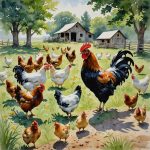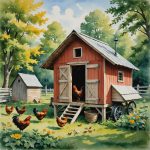As the winter chill sets in and the frost begins to coat the landscape, chicken owners are faced with a common challenge: how to keep their feathered friends‘ water from freezing. With a variety of methods and tricks available, finding the best way to ensure a consistent water supply for your chickens during the colder months can be a daunting task. In this article, we will explore some creative and effective solutions to keep your chickens hydrated even when the mercury dips below freezing.
Table of Contents
Preventing Chicken Water From Freezing
During the winter months, keeping your chickens’ water from freezing is essential for their health and well-being. Luckily, there are several effective methods you can use to prevent this common issue. One of the best ways to keep chicken water from freezing is by using a heated waterer. These specialized waterers come equipped with a heating element that keeps the water at a constant temperature, preventing it from freezing even in the coldest of temperatures. Investing in a heated waterer is a simple and effective solution that will save you time and worry during the winter months.
Another effective way to prevent chicken water from freezing is by insulating the waterer. you can wrap the waterer in insulating material such as foam or bubble wrap to help retain heat and prevent freezing.Additionally, placing the waterer in a sheltered area, such as a coop or barn, can also help protect it from freezing temperatures. By taking these simple steps, you can ensure that your chickens always have access to fresh, unfrozen water, keeping them happy and healthy throughout the winter season.
insulating Water Containers to Maintain Temperature
Keeping your chickens’ water from freezing in the winter can be a challenging task, but with the right insulation techniques, you can ensure that thay have access to water at all times. One of the best ways to maintain the temperature of your water containers is by using insulating materials such as foam or bubble wrap. Simply wrap the material around the outside of the container to help trap heat and prevent the water from freezing.
Another effective method is to place the water container inside a well-insulated box. This will provide an extra layer of protection against the cold temperatures and help maintain the water’s temperature. You can also use a heated base or heating pad underneath the container to keep the water from freezing. By insulating your water containers properly, you can ensure that your chickens stay hydrated throughout the winter months.
Utilizing Heated Water Bases for Constant Access
When it comes to ensuring that your chickens have constant access to water in the cold winter months, utilizing heated water bases is key. These bases are designed to keep the water in your chicken’s waterer at a temperature that prevents freezing, ensuring that your flock always has access to fresh, liquid water.
One of the best ways to keep your chicken’s water from freezing is to invest in a high-quality heated water base. These bases are typically designed to fit underneath your existing waterer, providing a warm surface that helps prevent freezing.Additionally, some heated water bases come with adjustable temperature settings, allowing you to customize the level of heat based on your local climate. By investing in a heated water base, you can ensure that your chickens always have access to fresh water, even on the coldest of days.
Additional Tips for Winter Watering Success
One of the best ways to ensure your chickens have access to unfrozen water during the winter months is to invest in a heated waterer.These devices are designed to keep the water at a constant temperature,preventing it from freezing over. Heated waterers come in a variety of sizes and styles,so you can choose the one that best fits the needs of your flock.
Another tip for keeping your chickens’ water from freezing is to insulate their water supply. You can do this by placing the waterer inside a small insulated coop or shed, or by wrapping it in insulation material.This will help to retain heat and prevent the water from freezing as quickly. Additionally, make sure to check the waterer regularly and break up any ice that may form on the surface. By taking these extra steps, you can ensure that your chickens always have access to fresh, unfrozen water throughout the winter season.
Q&A
Q: What is the best way to keep chickens’ water from freezing during the winter months?
A: Keeping chickens’ water from freezing in the winter can be a challenge, but there are several effective methods to prevent this issue.
Q: What are some traditional methods to keep chickens’ water from freezing?
A: some traditional methods include using heated waterers, adding apple cider vinegar to the water, and placing a floating ball or ping pong ball in the water to prevent it from freezing.
Q: Are there any DIY solutions to prevent chickens’ water from freezing?
A: Yes, DIY solutions like insulating the water container with a foam sleeve or placing a light bulb near the water source can help keep it from freezing.
Q: How vital is it to provide chickens with unfrozen water?
A: It is crucial to provide chickens with unfrozen water as they need to stay hydrated, especially during the winter when their water source is more likely to freeze.
Q: Can you recommend any specific products or tools to keep chickens’ water from freezing?
A: Some recommended products include heated waterers, heated bases, and insulated water containers that are specifically designed for keeping chickens’ water from freezing.
Q: Is there a specific temperature at which water is more likely to freeze?
A: Water is more likely to freeze when temperatures drop below 32 degrees fahrenheit, so it is important to regularly check and monitor the water source during cold weather.
Q: How often should chickens’ water be checked and refilled during the winter months?
A: Chickens’ water should be checked and refilled at least twice a day during the winter months to ensure that they have access to unfrozen water at all times.
Insights and Conclusions
keeping your chickens’ water from freezing doesn’t have to be a daunting task. By implementing some simple strategies such as using heated waterers, insulating water containers, or adding a warm water source to their coop, you can ensure that your feathered friends have access to liquid water even on the coldest winter days. So, don’t let the chill of winter freeze out your poultry care routine – take these tips and keep your chickens clucking happily all season long!
Meet Walter, the feathered-friend fanatic of Florida! Nestled in the sunshine state, Walter struts through life with his feathered companions, clucking his way to happiness. With a coop that’s fancier than a five-star hotel, he’s the Don Juan of the chicken world. When he’s not teaching his hens to do the cha-cha, you’ll find him in a heated debate with his prized rooster, Sir Clucks-a-Lot. Walter’s poultry passion is no yolk; he’s the sunny-side-up guy you never knew you needed in your flock of friends!





